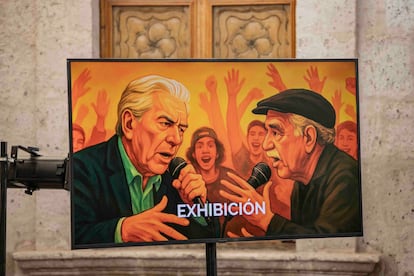—Library and “lleca” to reach the eureka.
A boy with baggy pants, sunglasses and a backwards cap is overturning some prejudices this afternoon. It’s called Stick, it comes from a Lima that does not have a view of the sea nor is it listed in tourist packages. He is from Mangomarca, an arid area of the San Juan de Lurigancho district, where land traffickers have more power than the authorities. He is accompanied by Almendrades, a young man, dressed in black, with a wool cap, and Andromeda, a thin girl, with high ankle boots and a collection of tattoos that adorn her bare arms.
Stick, Almendrades and Andromeda are the teachers of the day. An improvised rap workshop that was part of the International Congress of the Spanish Language, in Arequipa. An event that breaks healthily with the program. The place: neither more nor less than the Mario Vargas Llosa Library. It is not a heresy, but an act of vindication towards those who shine in the oral battle of words.
The Nobel Prize in Literature once said that the transcendence of an artist depended on three aspects: craft, ideas and culture. The trio of rappers show that they are on that wagon. They have sufficient credentials: Stick has won the Red Bull Battle of Roosters three times, Almendrades is the current champion and Andromeda embodies the Arequipa talent for rhyming with meaning and releasing truths in a double-tempo key.
The auditorium, which initially looked half empty, has filled up. Stick explained in a didactic way what he ignored for a good part of his career: that his rapped inspirations had names and drank from literature. The simile, the metaphor, the anaphora, the hyperboles and the calambur. As his presentation progressed, the Peruvian writers César Vallejo, Mariano Melgar, Blanca Varela and Julio Ramón Ribeyro appear on the screen, having a cigarette. “When we were in the parks we didn’t waste time. The mind learned things. We just weren’t as aware,” says Stick.
The audience giggles in amazement when they see, thanks to artificial intelligence, in a corner of the stage, the two giants of the continent, staring at each other and holding the microphone: Mario Vargas Llosa and Gabriel García Márquez. A duel of immortals who knew something about playing with words. They are used as an example to point out that, in the midst of the effervescence of a fight, rivals must demonstrate height. Attack aggressively, but without low blows. Dismantle arguments with satire and not with flattery.
Some of the exercises recommended by these specialists freestyle: sequences and endings. The first consists of choosing a word and immediately saying another that is related until forming a long chain, where in thirty seconds the rapper started with Garcilaso de la Vega and ended up talking about paternity. As in everything, mastery is achieved with practice. More words in less time to expand your vocabulary and speed up your mind and language.
The second tip is to launch a list of words that contain the same ending. For example: ero. Butcher, garbage man, jailer, and so on. Rapper who doesn’t think at a hundred per hour is out of the league. But it’s not just about technique, devouring dictionaries and picking up the pace, it’s about dealing with the most powerful enemy: yourself. Having the nerve to form a club with words in front of thousands of people.
The workshop was about to end when a young woman of over seventy years old took the floor to say thank you. “This is not just about you. Rap can save us from Alzheimer’s. Thank you because today we have learned a lot,” he said. Stick, the freestyler who got on buses and sold sweets before filling coliseums, took off his glasses and the shine of joy took over his eyes. The rapper was left speechless.

